#bran isolde
Explore tagged Tumblr posts
Text

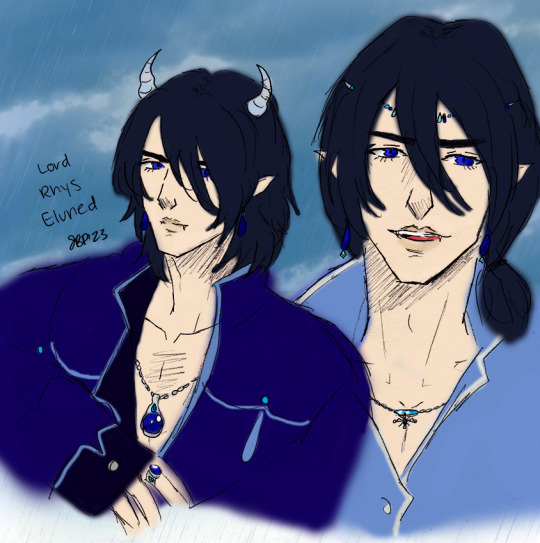
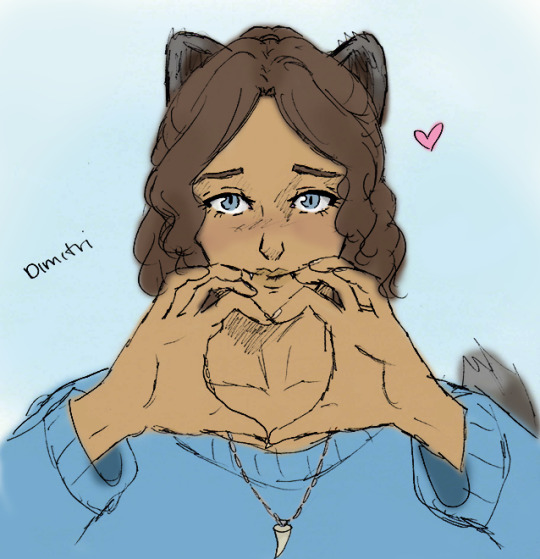


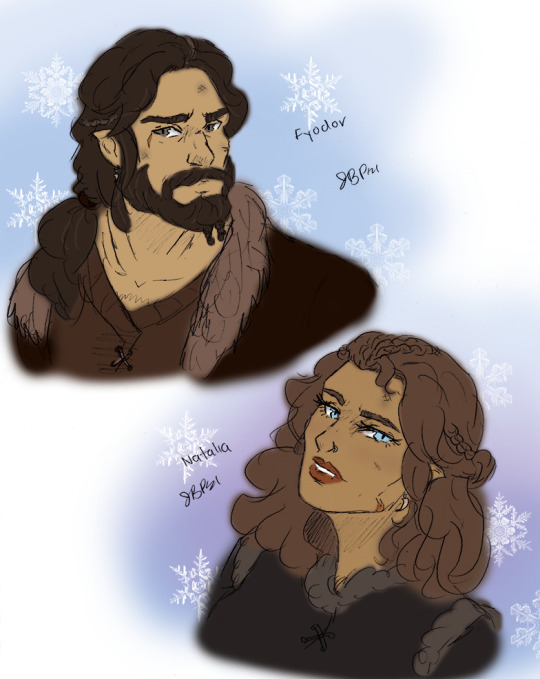
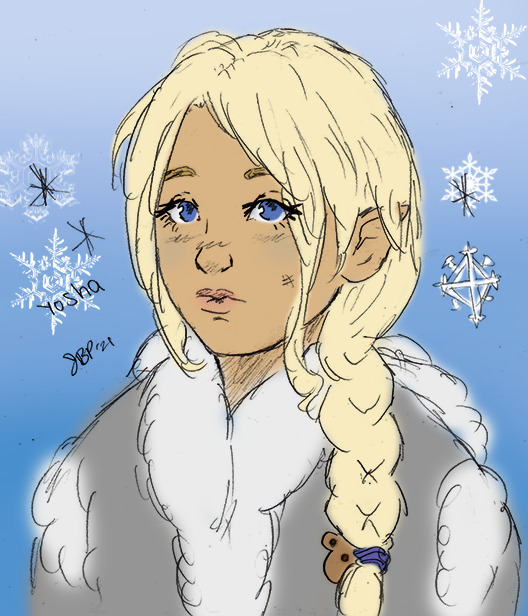
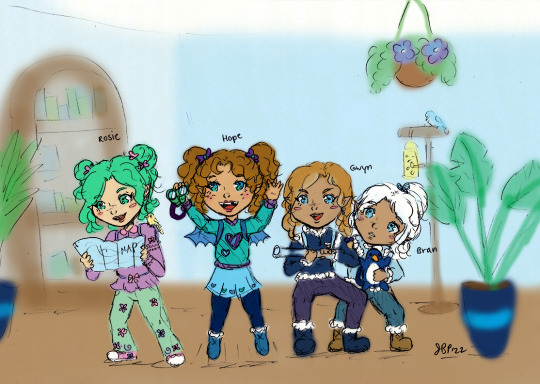
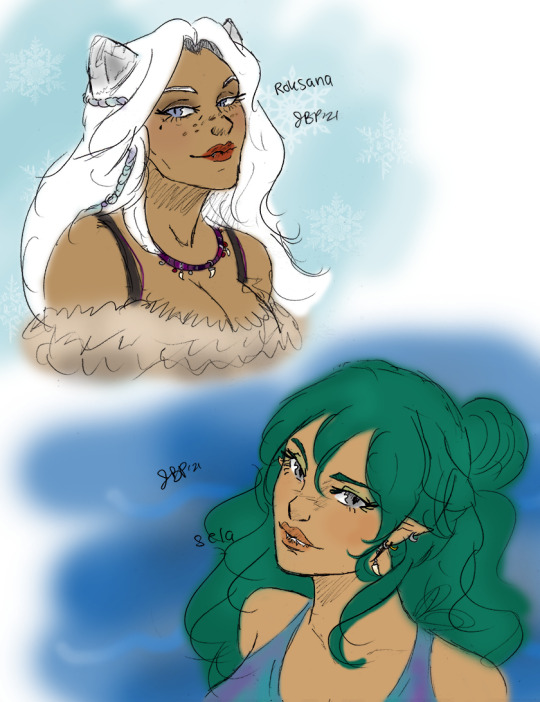
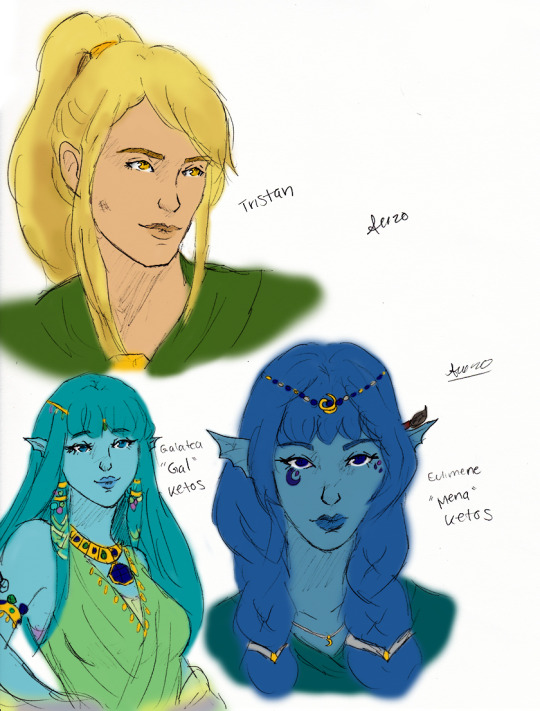
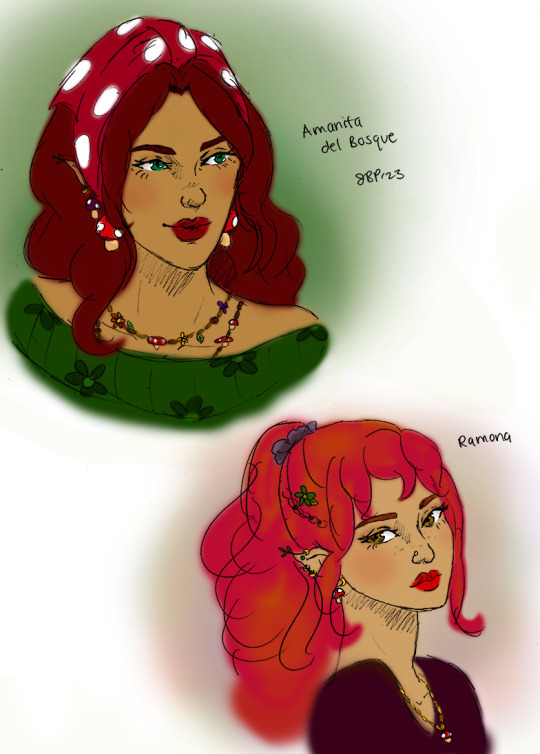

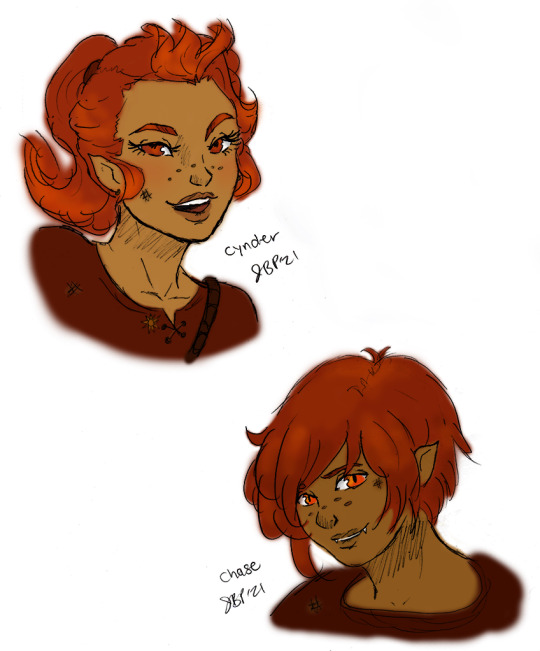
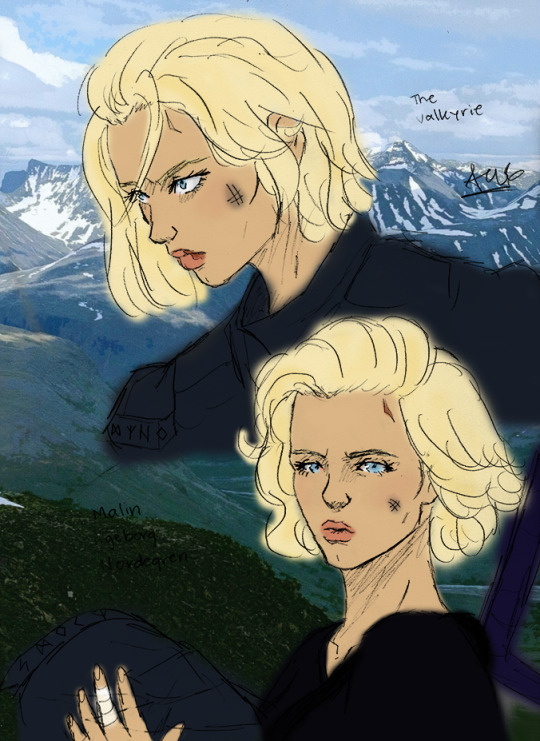
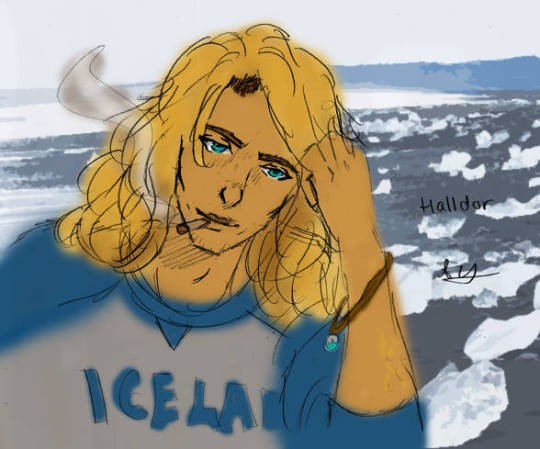
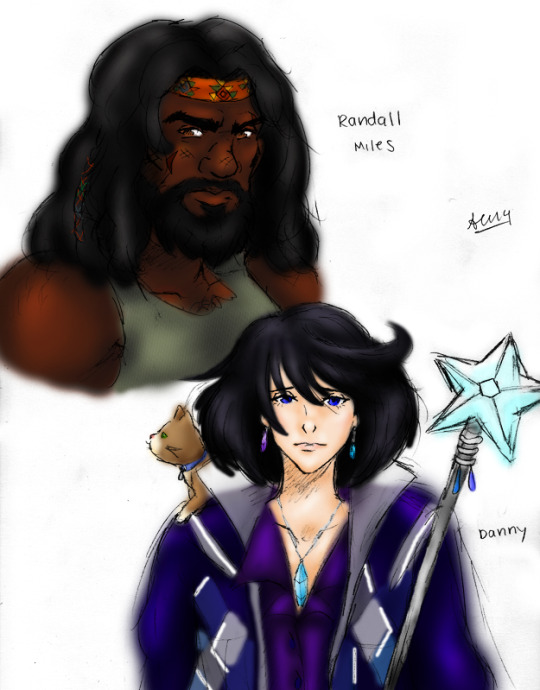
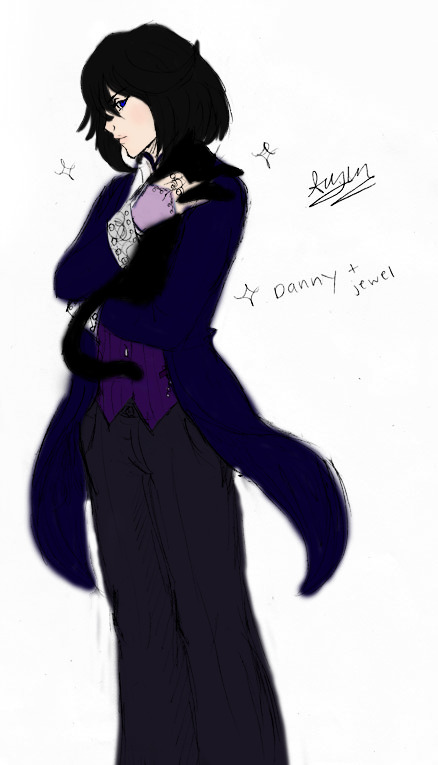

Spaceverse Faer sketch dump, part 3!
Back again with more recent colored/WiP sketches of Faer related characters. This time we have, in order: Rhys, Esther, and their son Daniel (Danny) when he was younger, then Rhys solo, then some Fomorian/Fae characters with Dimitri, his sister Sasha, their parents Fyodor and Natalia, and Yosha. Then we have a chibi drawing of some of the kiddos, Rosie, Hope, Gwyn, and Bran. After that we have Roksana, the wildfae Sela, Tristan (should be with the Phanos characters, but he happened to be on this page), Galatea (Gal), Eulimene (Mena), Amanita, her daughter Ramona (both newly introduced to take the roles of Aliana and Joan), Aedus, Cynder and her little brother Chase.
Then there's some older sketches that predate the RP, including: Malin, Halldor, Randall (not yet in the RP, but will likely appear as an ally/friend of Josefa's on Apex Prime), Danny (doesn't have his Spaceverse color palette here, this is from a previous story world where he was a human mage with water magic), another Danny sketch from before this RP, and then a very old sketch of Ancia and Arlen that I still love and wanted saved here.
Dimitri, Yosha, Rosie, Bran, Cynder and Chase belong to Sakume, and the other characters depicted here belong to me.
#spaceverse#amanita del bosque#ramona del bosque#aedus conleth#chase#cynder#dragon#dragon shifter#eulimene ketos#mena ketos#galatea ketos#gal ketos#undine#tristan#gaius yellow#rhys eluned#esther eluned#daniel eluned#fyodor volkov#natalia volkova#sasha volkova#dimitri volkov#dimitri reynard#rosie gale#danny eluned#hope asterling#gwyn isolde#bran isolde#oighear#my art
2 notes
·
View notes
Text
On making a Welsh version of the entire story of King Arthur:
No Lancelot and No Affair. PERIOD. And absolutely no compromise or cheating on this one: you cannot turn anyone else (coughBediverecough) into a Lancelot analogue. You must sacrifice the Love Triangle completely - no "duty vs. love" drama. You're going to have make do without that conceit. You must exercise your own creativity and forge a different dramatic conflict for Arthur and Gwenhwyfar, if at all.
Supplementary to the above: Divorce is legal.
Arthur is at the forefront. Sometimes, Cai, Gwalchmai and Bedwyr is the focus of a particular adventure, but Arthur is a Man of Action, who often outdoes his own warriors. And in particular, he may not even be a King - he may even just be a military chief (Wleddig, Ameraudur or Dux Bellorum), freeing him up to rove around.
Giants, not fairies, as the primary supernatural race Camelot interacts with. Next to that, Saints and Deities come afterwards.
Note that Queen Guinevere herself is the daughter of a giant.
On the legal side: Celtic Law is Tort Law - a weregild system is at play, known as Saraad (Insult/Honor Price) and Galanas (Injury/Homicide Price). Livestock as a measure of wealth. Inheritance system is Gavelkind (although tribal politics may come into play. See Tanistry).
Emphasis on Poetry, Song and Poetic Speech. Englyns are recommended. Bards as serious authority figures.
Be liberal with the supernatural. Mystical items are always fought over and Knights have cyneddf, or mystical abilities.
The Grail Quest has to be whole sale rewritten and given a new mythos: it's either "The Raid on the Otherworld" where the story is about the capture of a mystical Cauldron (Preiddu Annwfn). AND/OR. It's the Peredur version of Perceval, involving a Severed Head instead of a Grail - Maybe its Bran the Blessed himself! - and possibly a battle with the "Nine Sorceresses"
Exceptions to the "No Affair" rule: Medraut and Melwas. The former requires commitment to Traitor!Guinevere and the latter ends with Arthur winning and taking back Guinevere, whether Melwas lives or not.
The Fall of Camelot - There 3 options for how it should unfold without Lancelot: a) defaulting towards Historia Regum Britanniae's version of events. b) the Gwenhwyfach feud. And c) Non-Traitor Medraut ending. The first, similar to the No Affair exception, requires commitment to Traitor!Guinevere. The second involves establishing Gwenhwyfach as a character in her own right. The third and last is the most difficult: the writer must concieve a sufficiently satisfying third party as an opponent for Arthur and Mordred for a tragic last stand.
No Incest. Medraut remains Arthur's Nephew.
No Villain!Morgan
Optional for the above: Iddog Cordd Prydain as an instigator for the hostilities between Arthur and Medraut
As an extention of the "No Lancelot" rule, No Lady of the Lake and No Galahad either.
Arthur assumes the throne through normal means - No Sword in the Stone or Sword from the Lake. Kings Lot and Urien are allies all they way. Excalibur/Caledfwlch is part of a set of Three Holy Weapons, the others being Rhongomyniad and Carnwennan.
Exceptions to the "No Affair" rule: Edern ap Nudd as Guinevere's lover. Highly unrecommended, either for potentially establishing a Love triangle (defeating the whole purpose of removing Lancelot) and for potentially resulting in Arthur's early, non-Camlann death.
Trystan and Essyllt potentially do not end in tragedy (Total omission of Brittany, Isolde White Hands and the Black Sails motif) (Writer's choice). Although Mark could still treacherously kill them both, ala Prose Tristan.
King Mark as potentially Conomor the Cursed.
#spur of the moment and off the top my head#on how a genuine welsh version of the Arthur epic would have to play out#let me know if anything is missing or something is incorrect#king arthur#arthuriana#queen guinevere#arthurian mythology#arthurian legends#arthurian literature#welsh mythology#welsh arthuriana#my thoughts
357 notes
·
View notes
Note
what do you think of rhaegar x lyanna?
The asoiafblr equivalent of

I suppose I did have it coming though. What we know of their relationship definitely compels me, and I’ll start by elaborating on this post—besides the readily apparent Paris/Helen and Tristan/Isolde allusions, Rhaegar and Lyanna remind me of the principal characters from Thomas Chestre’s Arthurian romance Sir Launfal but gender-swapped. Let’s start with the Tourney at Harrenhal.
But the next morning, when the heralds blew their trumpets and the king took his seat, only two champions appeared. The Knight of the Laughing Tree had vanished. The king was wroth, and even sent his son the dragon prince to seek the man, but all they ever found was his painted shield, hanging abandoned in a tree. It was the dragon prince who won that tourney in the end. (ASOS, Bran II)
Ned remembered the moment when all the smiles died, when Prince Rhaegar Targaryen urged his horse past his own wife, the Dornish princess Elia Martell, to lay the queen of beauty’s laurel in Lyanna’s lap. He could see it still: a crown of winter roses, blue as frost. […] Promise me, Ned, his sister had whispered from her bed of blood. She had loved the scent of winter roses. (AGOT, Ned XV)
Now I’m sure the following won’t be news to asoiaf veterans but for the sake of comparison let’s lay it all out. It hardly seems an accident that the infamous laurel happened to be made of a flower beloved of its recipient; most likely Rhaegar did in fact find the Knight of the Laughing Tree, who turned out to be one Lyanna Stark, they conversed, and since she had had to flee the tourney and thus forfeit her chance of winning, he decided to win it himself in order to honor her publicly in the only way possible by making her Queen of Love and Beauty (not a particularly strategic move, but I have to say that I appreciate the sort of fairy-tale logic of it all), and finally, if you believe that Lyanna ran away with Rhaegar willingly, they may have also made plans to correspond secretly in the future. With all of this in mind let’s take a look at some of the pertinent story beats of Sir Launfal:
Launfal rides off alone into a forest and rests under a tree
Two maidens approach and invite him to speak to their lady Tryamour in her pavilion
Tryamour is the ethereally beautiful daughter of the powerful fairy king of the west
The knight and the fairy princess profess their love for one another, she bestows upon him several gifts, and they make plans to correspond secretly in the future.
Rhaegar may be a less obvious choice than Lyanna “Knight of the Laughing Tree” Stark for comparison to a character of the opposite gender, but the gender paradigm in Sir Launfal is already an interesting one given that the fairy princess provides financially for her knight lover and ultimately rescues him like he’s a damsel in distress (more on that later). Bran’s response to Meera’s story also contains a sly hint:
It was a good story, Bran decided after thinking about it a moment or two. “Then what happened? Did the Knight of the Laughing Tree win the tourney and marry a princess?” (ASOS, Bran II)
Furthermore, similarly to Lyanna, Rhaegar has experienced some friction in regard to his proscribed Westerosi gender role, also expressed by his relationship to armament:
As a young boy, the Prince of Dragonstone was bookish to a fault. He was reading so early that men said Queen Rhaella must have swallowed some books and a candle whilst he was in her womb. Rhaegar took no interest in the play of other children. The maesters were awed by his wits, but his father’s knights would jest sourly that Baelor the Blessed had been born again. Until one day Prince Rhaegar found something in his scrolls that changed him. No one knows what it might have been, only that the boy suddenly appeared early one morning in the yard as the knights were donning their steel. He walked up to Ser Willem Darry, the master-at-arms, and said, ‘I will require sword and armor. It seems I must be a warrior.’ (ASOS, Daenerys I)
“Lyanna might have carried a sword, if my lord father had allowed it.…” (AGOT, Arya II)
Now let’s take a look at why Lyanna and Launfal might have decided to run away with the royals they met in the woods.
“Robert will never keep to one bed,” Lyanna had told him at Winterfell, on the night long ago when their father had promised her hand to the young Lord of Storm’s End. “I hear he has gotten a child on some girl in the Vale.” (AGOT, Ned IX)
Launfal and other noble knights, however, did not like [the future queen Guenevere], for the lady had a reputation for having lovers besides her lord too numerous to count. (Sir Launfal, trans. James Weldon)
Soon enough Launfal finds himself the unwelcome focus of the queen’s amorous intent and his refusal goes very poorly. He is saved when his princess lover rides up to Camelot and takes him away to the land of the fairies, leaving naught but a rumor in his wake:
Every year upon a certain day people can hear Launfal’s steed neigh and see him. Whosoever desires to joust and keep their armour trim in tournament or fight can find his match with Sir Launfal, the knight. (Sir Launfal)
Which of course tracks nicely with the happenings at Harrenhal:
The mystery knight dipped his lance before the king and rode to the end of the lists, where the five champions had their pavilions. […] The porcupine knight fell first, then the pitchfork knight, and lastly the knight of the two towers. None were well loved, so the common folk cheered lustily for the Knight of the Laughing Tree, as the new champion soon was called. (ASOS, Bran II again)
All this to say that I find their relationship quite fascinating in its metatextuality. Was it love at first sight as in Sir Launfal? Almost certainly not, but it seems clear to me that they had a strong connection and I’m glad Lyanna was able to escape the arranged marriage to Robert which she clearly did not want. As for the common discourse topics on here regarding their relationship i.e. their respective ages, his marital status, the prophecy, these generally just aren’t that interesting to me…and post.

41 notes
·
View notes
Text
Quick I can't be bothered to make the post myself so just imagine one of those web weaves. Something something Catelyn Stark something something Isolde Guerrin. Protecting the boy protecting the crown protecting your political interests at the cost of your wife. Foreign woman in her husband's court, wielding what power she has. Something something just wanting nothing more than for her son, her baby boy to be okay. "I want you to leave." "Tell me you wouldn't move mountains to save him." Not knowing what to do but hate the boy your husband brought home, hate everything he represents, joy at seeing him lost to some order that will surely spell his death or at least just keep him away from you. All these political games and for what, your family is ripped apart! And you die! Anyway. Thinking thoughts I love women who hate their fake bastard sons and the absolute earth shattering will to do WHATEVER it takes to keep your family whole. Don't even get me started on bran and Connor. What did your mother die for, and how? What will you see one day, little mage?
#he speaks#isolde guerrin#i dont really want to bother tagging catelyn bc this is more for da fans to enjoy#dragon age origins#dao#finns dragon age blathering
9 notes
·
View notes
Text
@songofamazon
#dragon age#dragon age poll#dragon age polls#poll#dragon age origins#dragon age 2#dragon age inquisition#requested
17 notes
·
View notes
Text

OPEN STARTER, ( 6 / 5 ) bran keep, training yard

they suppose it is a telling thing to note where their sympathies lie after the attempt on their cousin's life. they suppose they should care just a little more than they do, but the truth was that isolde was already preparing for the worst. only those who have seen the gruesome effects of battle and blood spilled know the beginnings of a war when they see one, and this was one that isolde had been waiting for most of their life. the sweat collects on their brow the more force they use, their sword leaving indents with little wooden carvings falling around them as though it were a real enemy and not just a wooden dummy. their senses hone in on the crunch of leaves behind them and in a moment their sword raises and their body shifts to face the newcomer, tip of the blade pointed right at their chest with a precision that only comes with hours of training and dedication of a warrior.
"state your business."
3 notes
·
View notes
Note
‘Ship Bias’
Send ‘Ship Bias’ and I will share up to 5 Ships I have a bias for for my muse!
I don’t think it’s any secret that Canarrow ie Oliver/Sara is my favorite canon ship for Sara of all time. Their chemistry was off the charts. They understood one another in ways that no one else could, having both endured the Gambit going down together and time on Lian Yu, not to mention their separate and yet similar paths of being turned into weapons. And yet he was the one who convinced her to come home, who convinced her she didn’t have to continue to be a weapon, that she could fight for good - to save lives instead of ending them. He was the one who was helping her to find her way before all hell broke loose. With that being said, there’s a million other little things: the way they fought alongside one another, the way they anticipated each other’s thoughts and words and actions, their small touches (and their passionate ones!), their moments of understanding when certain things were too difficult to discuss, etc. They were two sides of the same coin. As Caity said, she was basically the female version of the Green Arrow. And if left together, they would’ve become something marvelous.
Non canon-wise, and I’m only referring to current active ships, I love Bran and Sara. I feel like they’re building a life together from the ground up, and it’s interesting to see her do so with someone who’s outside of the Starling City madness. The Tristan and Isolde AU has been everything from romantic to infuriating to heartbreaking and I can’t wait to see where it goes next. But when it comes to @adsagsona they could write a rock, and I would find a way to ship it with Sara so 🤷🏼♀️
Other than that, it’s just chemistry. Characters I feel fit well with Sara, and her particular brand of darkness, quips, and clothing/food thievery. Oh, and if there are any active ships I forgot, or potential ships that I haven’t mentioned, please forgive me. I’m just going off of the top of my head as to what I’m actively currently shipping and my favorite canon ship.
13 notes
·
View notes
Text
ཐི♰ཋྀ ˚₊‧⁺ ﹙int.﹚ marya’s apartments, evening. @sunstaiined;isolde
“ which of us will be next, do you think? ” marya sprawls half-inclined over the arm of an ornamented settee, peeling the yellowish�� skin from an apple in leisurely movement. the question is asked with perfect insouciance; as easily as one may inquire upon the weather, or what accompaniments they would like with their tea. it is clear where her heart lies in this moment, and it is not with stefan — but amongst the pandemonium suffusing bran keep, her little snout scenting for every salacious crumb to be gathered. “ one of his children? if indeed the purpose of their violence, what better for the crown's instability? yet these other hysterias seem disjointed; not the mode of operation you might expect of an efficient assassin, but who else could achieve such proximity to our king? elude all of the divine present? unless this conspiracy is quite far-reaching ... i was inclined to believe that sorry maiden's purported exsanguination the work of superstition, but now — isolde? cousin, are you hearing me? ”

0 notes
Text
𝐀𝐂𝐂𝐄𝐏𝐓𝐄𝐃 — the cobbled roads of coňstanja beckons you forward, isolde dragova, lorelai andersen, jayesh adani, morana salvador. bearing the likeness of emma d'arcy, alisha boe, dev patel, jodie turner smith — your beauty has been spoken of across the realm. please ensure you have studied the checklist, and submit your account within 24 hours.

emma d’arcy . non binary . they / them . wasn’t that isolde dragova walking the cobbled roads of coňstanja? it’s nice to see the cousin to the king & lieutenant out and about on such a fine day as this. i’ve heard from the court spies that they are notoriously brutal, whilst also managing to be quite assiduous. the thirty two year old is eager to explore bran keep. i heard that they themselves aren’t divine. it’s funny, whenever i think of them, i think of fracture patterns in porcelain exposed knuckles, wood where it rots in the hollow carcass of a home long since abandoned, passion passion passion in the diary of an oxygen thief.
alisha boe . cis woman . she/her . wasn’t that lorelei andersen walking the cobbled roads of coňstanja? it’s nice to see the gardener out and about on such a fine day as this. i’ve heard from the court spies that they are notoriously talentless, whilst also managing to be quite determined. the twenty-six year old is eager to explore bran keep. i heard that they themselves aren’t divine. it’s funny, whenever i think of them, i think of a gracious heart sullied by an infatuation with revenge, a sisyphean resistance to your own ineptitude, the growing suspicion that you’re in over your head.
dev patel . demi-man . he/they . wasn’t that jayesh adani walking the cobbled roads of coňstanja? it’s nice to see the playwright out and about on such a fine day as this. i’ve heard from the court spies that they are notoriously impractical, whilst also managing to be quite perceptive. the thirty one year old is eager to explore bran keep. i heard that they themselves are divine ( solarui ). it’s funny, whenever i think of them, i think of tales of corruption carefully woven beneath beautified words, wine induced late nights spent in creative fervor, an undeniable fire carried for what’s right.
jodie turner smith . demi-woman . she/they . wasn’t that morana salvador walking the cobbled roads of coňstanja? it’s nice to see the master assassin and about on such a fine day as this. i’ve heard from the court spies that they are notoriously cruel whilst also managing to be quite scrupulous. the forty old is eager to explore bran keep. i heard that they themselves are divine ( salvatore ). it’s funny, whenever i think of them, i think of wielding the dual hand of life and death, an insatiable desire for dominion, a master of tongue spun webs.
0 notes
Photo






#dragon age#dragon age 2#hawke#tallis#bann teagan#isolde#leliana#seneschal bran#serendipity#duke prosper#dulci de lancet#schmooples shot#jacob hawke#mineda2#lots of redheads at this party lol
11 notes
·
View notes
Note
young Brandon Stark fancast? (Wild Wolf, not Bran)
Henry Cavill, but specifically when he was in Tristan & Isolde as he is three years older than Brandon was when he died in this movie.

39 notes
·
View notes
Note
Isolde conspires to get Brangaine and Palamedes under a mistletoe
Isolde: Tris, I push Bran and you push Pal. It will be the perfect plan.
Tris: Are you sure pushing them will work?
Isolde: Yes.
They push the two into each other. They bang into each other.
Isolde: I mean their lips did meet? Sure they’re bleeding now but they did kiss!
Tristan: honey, *shakes his head and puts his hand on her shoulder.* Time for a new plan.
#Brangaine#Palomides#tristan and isolde#operation branmedes#sure that’s the ship name I’m going with
2 notes
·
View notes
Text
Nyx’s Complete List of Goth Names
Abaddon: From Greek, means "destruction" or "demon of the pit."
Acheron: The River of Woe in the Greek underworld.
Achlys: Greek primordial goddess of poison, misery, and sadness, personification of the death-mist.
Adonis: Means "lord" (as in Adonai). In Greek mythology, the most beautiful youth in the world, loved by both Persephone and Aphrodite. Died tragically.
Adrian/Adrienne: English, from Latin; means "from Hadria" (the Adriatic Sea). I've heard sources saying it means "dark one," but I haven't been able to confirm this. It's still a really cool, kind of gothy name. (Also the real name of Alucard from Castlevania.)
Ahriman: The Zoroastrian devil/evil god.
Akeldama: Means "field of blood," a place in Jerusalem associated with Judas.
Alastor: Greek, means "avenging spirit."
Alcmene: (Female) Means "might of the moon," Heracles' mother in mythology.
Alecto: One of the Erinyes (Furies), the goddesses of vengeance. Means "unceasing."
Altair: The brightest star in the constellation Aquila (the Eagle), from Arabic, meaning "the bird."
Amaranth: (Female) Greek; a mythical purple flower that never fades, a symbol of immortality.
Amethyst: A dark purple crystal, associated with wine and preventing drunkenness.
Andromeda: Greek, means "thinks like a man," the name of a princess in mythology, a constellation, and a galaxy.
Anubis: Jackal-headed Egyptian god of death and embalming.
Arcana: From Latin "hidden, secret" (literally "to shut in a chest"), refers to secrets or mysteries. Also refers to the groups of cards in a tarot deck (the major and minor arcana).
Arianrhod: Means "silver wheel," Welsh goddess of the moon, stars, and the flow of time.
Artemis/Diana: Greco-Roman goddess of the hunt, the moon, and virginity
Asmodeus: Means "wrath-demon," a Goetic demon appearing in a number of texts, representing luxury, sensuality, and lust. (Also Asmodai)
Asphodel: A white flower planted on graves, said to grow in the Greek underworld, and therefore heavily connected with death.
Astaroth: (Unisex) A demon in the Ars Goetia (from the Lesser Key of Solomon), described as a male demon and a Duke of Hell, but the name likely comes from the Phoenician goddess Astarte (or Ashtoreth), who is a version of Ishtar (Babylonian) and Inanna (Sumerian).
Astor: A French and German name from Occitan, meaning "goshawk." A goshawk is a bird of prey. I've read on naming sites that this name was originally a derogatory term for young men with hawk-like, predatory characteristics, but I haven't found anything to confirm this. This is the name of my alter-ego and one of the main protagonists of Shadowbook.
Astra/Astrid/Asteria: From Greek, "star." In Greek mythology, Asteria was a Titaness of astrology and prophecy, the mother of Hecate. An aster is also a star-shaped flower.
Atropos: The last of the Moirai (Fates), who cuts the thread at the end of life.
Autumn: The darkening part of the year, when everything is dying, and Halloween happens.
Azrael: The name of the Angel of Death, means "whom god helps." (Also Asriel)
Azazel: A Watcher's name, means "scapegoat." Taught humanity the arts of weaponry and cosmetics. Commonly associated with demons and evil.
Baphomet: A goat-headed, winged deity associated with Satanism; obscure etymology.
Bastet: Egyptian goddess of cats.
Belial: A Hebrew name meaning "worthless," a name of the devil or a demon.
Belladonna: Also called "deadly nightshade," an extremely poisonous plant that causes hallucinations and death.
Bellona: Roman goddess of war
Bezaliel: Means "shadow of God" or "damaged," a Watcher's name.
Blodeuwedd: Pronounced "bluh-DIE-weth," means "flower-face." A Welsh goddess who was turned into an owl.
Bram/Brom: Technically short for Abraham ("father of a multitude"), the author of Dracula, Abraham "Bram" Stoker.
Bran: Welsh, "raven." The name of Bran the Blessed, a giant and king of Britain in Welsh mythology.
Branwen: (Female) Welsh, means "white raven" or "fair raven."
Breksta: Lithuanian goddess of night, dreams, and twilight.
Caligo: Latin word for “mist,” “gloom,” and “darkness.” (Calignes is the plural, which could also work) (feminine)
Calypso: Greek, "she who conceals." The nymph who kept Odysseus imprisoned on her island.
Carmilla: A lesbian vampire from the gothic novel of the same name, predating Dracula. The name seems to have been invented by the author.
Cassius: Roman, "empty, hollow."
Ceridwen: Welsh enchantress or goddess who stirs the cauldron of poetic inspiration.
Cernunnos: Celtic forest god depicted as having a stag's antlers.
Chiroptera: Literally means "hand wing," the order of bats in taxonomy.
Circe: Means "circle." In Greek mythology, a sorceress who turned Odysseus' men into pigs (and later helped them).
Cora: From the Greek name Kore, meaning "maiden." A name for Persephone. (Also, Coraline.)
Cornix: A princess transformed into a crow by Athena in Ovid's Metamorphosis.
Corvus/Corax: Corvus corax is the scientific name of the common raven.
Crimson: Dark, rich red, the color of wine or blood. One of the Gothiest colors that isn't black. It's very easy for this to sound banal or cringey, especially if it's a character's given name, so use with caution. Scarlet works, too, if you want something easier to use as a given name.
Damian: From Greek, means "to tame," tends to be associated with demons or vampires, a bit cliche at this point.
Dantalion: A Goetic demon, the name is particularly cool.
Desdemona: A tragic character in Othello, comes from Greek and means "ill-fated." Can be shortened to "Mona."
Desmodus: The genus of common vampire bats. (D. rotundus)
Devana: Slavic version of Artemis/Diana, goddess of the hunt.
Dorian: The corrupt, depraved, nearly immortal and astonishingly beautiful protagonist from The Picture of Dorian Gray. (Turns out Oscar Wilde invented the name; it did not exist before the book was written.)
Dracul: Romanian, "devil" or "dragon." What really needs to be said?
Ebony: A very dark wood.
Echo: In Greek mythology, a nymph who was cursed so she would only repeat the names of others; died while pining after Narcissus.
Edgar: Anglo-Saxon, "rich spear." The name of the one and only Edgar Allen Poe (also, my cat).
Eidolon: A type of spirit or ghost in Greek liteature. Also a genus of bats.
Eirlys: Welsh, "snowflake."
Elatha: An Irish god, described as the "beautiful Miltonic prince of darkness with golden hair." Not sure what the source for that is, but cool!
Elvira: Spanish, means "foreign true," a stereotypical Goth name (and the name of the Mistress of the Dark!). Actually, I first ran across the name in reference to a vengeful ghost called Elvira Blood in New England folk legend. Spooky!
Empusa: A kind of Greek female demon (similar to Lamia) that served Hecate.
Endora: Comes from the Witch of Endor, a Biblical sorceress.
Endymion: In Greek mythology, a handsome shepherd whom Selene fell in love with. Zeus granted him eternal sleep so he would never age. Means "to dive, to enter."
Erebus: Greek primordial god and personification of darkness.
Esmeralda: Spanish name meaning "emerald." (Also, the heroine in The Hunchback of Notre Dame.)
Ethelinda: Anglo-Saxon, means "little serpent."
Euryale: Greek, means "far-roming," the middle Gorgon sister.
Eurynomos: Greek chthonic spirit of corpses.
Eventide: It could work as a name.
Fenrir: A wolf demon in Norse mythology, the son of Loki.
Finvarra: Irish, King of the Fairies (and sometimes King of the Dead), a benevolent entity that ensures a good harvest and abundance.
Gabriel: The angel. Means "warrior of god." Gabrielle also works (and is the name of Lestat's mother).
Gehenna: A Hebrew name for Tartarus or Hell.
Golgotha: From Hebrew, "skull," the place where Jesus was crucified.
Grimm: The surname of two German brothers who recorded a classic collection of oral folklore and fairy tales, many of which are very... well, grim.
Habundia: A Celtic name for the queen of witches and night creatures, possibly another name for Nicnevan. Etymology uncertain.
Hades: The Lord of the Underworld in Greek mythology (also the name of the Underworld itself).
Hawthorn: A type of shrub steeped in folklore, associated with fairies and with Beltane (1st May).
Hecate: Greek goddess of witchcraft, magic, the occult, the moon, necromancy, the Underworld, and the crossroads. Means "worker from far off."
Hellebore: A type of evergreen flower, some species of which are poisonous. Believed to summon demons, also believed to cure madness.
Hemlock: A plant used to poison people.
Herne: "the Hunter," a ghost that haunts Windsor Forest (sometimes identified with The Horned God).
Hesperos/ia: The evening star.
Hypnos: The Greek god of sleep.
Iblis: Satan in Islamic lore.
Idris: Welsh, "ardent (passionate, fiery) lord."
Igor: Russian, "bow-warrior." Became famous as the name of Frankenstein's hunchbacked assistant, even though he doesn't exist in the book and his name in the original Universal film was Fritz.
Ingram: Swedish name meaning "Ing's raven."
Iolanthe: Greek, means "violet flower." (eye-oh-LAHN-thay)
Iseult/Isolde/Isolt: A tragic lover in Arthurian legend.
Jasmine: A type of flower, in this case referring to Cestrum nocturnum, or night-blooming jasmine.
Kali: Hindu goddess of destruction, name means "the black one."
Kasdaye: Means "hidden power," the name of a Watcher (another name for Tamiel). (Unisex)
Kiara/n: Gaelic, means "little black one."
Kimaris: A Goetic demon. (Male)
Kokabiel: Means "angel of the stars," a Watcher.
Lacrimae: Latin word for tears.
Lamia: A female demon in Greek folklore who devours children. The name of the witch in the film version of Stardust.
Lenore: A variant of Eleanor (also a good name), means "foreign," the lost love of the protagonist of "The Raven," also has her own poem.
Leshii: A Russian god of hunting, similar to Veles
Lethe: River of Forgetfulness in the Greek Underworld.
Leviathan: From Hebrew, "twisted in folds," a Biblical sea monster. Sometimes associated with Midgard's Serpent.
Libitina: A Roman goddess of corpses, funerals, and the dead.
Ligeia: Greek, the name of a Siren, also the subject of a Poe story of the same name.
Lilah: Comes from the Arabic Leila, meaning "night."
Lilith: Means "of the night" or "screech owl." In Hebrew mythology, Adam's first wife and the Queen of Demons. She refused to submit to Adam, so she left Eden and began screwing around with demons. Often considered a succubus or vampire, or a champion of feminism. A lilim is also a succubus or incubus.
Loki: Trickster god in Norse mythology with ambiguous morals.
Lorelei: German, means "murmuring rock," the name of a German Siren.
Lucius/Lucifer/Lucien: All mean "light" or "light-bringer," a name associated with Satan.
Lucy: From Dracula, also could be a shortening/feminization of Lucifer. (Still means "light.")
Luna: The Roman personification of the moon.
Lycoris: A Greek word that means "twilight," the name of an Asian red flower, associated with death and the underworld (much like Asphodel).
Maeve: Comes from Gaelic, means "the intoxicating one." Associated with the Fairy Queen Mab.
Makaria: Greek goddess of blessed death, a daughter of Hades and Persephone.
Mania: Etruscan/Roman goddess of the undead, ghosts, and underworld spirits, goddess of madness. Also a modern medical term referring to a specific mental illness.
Mara: A name steeped in darkness, referring to a nightmare spirit (nightmare), a (benevolent) goddess of death in Latvian mythology, a (male) demon in Buddhist mythology, and a Sanskrit word meaning "death."
Medea: In Greek mythology, the sorceress who helped Jason, but then went on a murderous rampage when he left her. Considered to be a priestess (or, rarely, daughter) of Hecate.
Megaera: One of the Erinyes (Furies), the goddesses of vengeance. Means "grudge."
Melanie: Greek, "black" or "dark."
Melantha: Greek, "dark flower."
Melinda/Mindy: English, "black serpent."
Melinoe: Greek goddess of ghosts, nightmares, and madness, a daughter of Hades and Persephone.
Mephistopheles: The name of the devil in the Faust legend, could be from Hebrew and mean "disperser of lies," or from Greek and mean "does not love the light."
Merle: (Unisex) from French, "blackbird."
Mina: From Dracula. Short for Wilhelmina, a German name meaning "will-helmet."
Morana/Marzanna: Slavic goddess of winter and death.
Morgan/Morgana: From Welsh, means "sea-circle," the name of Morgan le Fay, a sorceress in Arthurian Legend (who may be good or evil, depending on your interpretation).
Morpheus: The Greek god of dreams, the main protagonist of Neil Gaiman's Sandman comics. (Also, The Matrix.)
Morrigan: An Irish goddess of death, battle, and ravens, name means "great queen."
Morwenna: A Welsh name meaning "maiden." ("Morwanneg" is the name of the witch in Stardust.)
Nepenthe: A magical drug from the Odyssey that cures sorrow and causes forgetfulness.
Nephthys: Means "lady of the temple," the Egyptian goddess of the dead, mate of Seth and mother of Anubis.
Nergal: Mesopotamian god of death, war, and destruction.
Nicnevan: Queen of the Fairies in Scottish folklore. She is the Scottish version of Hecate.
Nightshade: A family of plants including tomatoes, potatoes, and eggplants, but also the notorious deadly nightshade.
Nisha/nt: A Hindi name meaning "night."
Nocturne: Self-explanatory. Refers to a night prayer, a musical composition evoking night, or a night scene in art.
Nyctala/Nyctea: Two obsolete genera of owls. Nyctala is the genus of Boreal owls before it was changed to Aegolius, and Nyctea was the genus of Snowy owls before it was changed to Bubo. Both probably mean or are related to "night."
Nyctalus: A genus of bats.
Nyctimene: A princess from Ovid's Metamorphoses who was so ashamed at having been molested by her father, she refused to show her face in daylight. Out of pity, Minerva (Athena) turned her into an owl. Also a genus of bats.
Nyx: A Greek primordial goddess and personification of the Night. (also Nox)
Oberon: From French, means "elf-ruler," the name of the Fairy King in A Midsummer Night's Dream (Referred to in one scene as the "king of shadows").
Obsidian: A shiny black volcanic stone.
Onyx: A type of banded stone, most famously black. (The word comes from the Greek for "fingernail.")
Ophelia: A tragic character in Hamlet, which probably comes from Greek and means "help."
Orcus: A Latin word for Hell, and a Roman god who punished the dead (possibly an epithet of Hades/Pluto).
Orion: A hunter in Greek mythology, and the famous constellation.
Orlok: The name of the ugly-looking vampire from Nosferatu.
Orpheus: Greek name, possibly comes from the word orphe, "darkness." The name of a demigod with an impossibly beautiful singing voice who attempted to rescue his love from the underworld, failed, and then died tragically.
Pan: Greek goat-horned god of nature, herds, and lust, induces "panic."
Pandora: Name means "all-gifted." In Greek mythology, the name of the first woman, who opened a box that unleashed evil upon the world.
Pandemonium: The capital city of Hell in Paradise Lost, name literally means "all demons."
Persephone: Greek Queen of the Underworld, wife of Hades, and goddess of springtime. You probably know her story. Her name might mean "thrasher of grain" (which would make sense for an agricultural goddess), but could also mean "slayer."
Phaenon: Means "shining" in Greek, refers to the planet Saturn (which has long been associated with darkness in mythology, being the furthest planet from the sun that is observable with the naked eye).
Pluto: Hades' Roman name, also the ninth planet, or what was the ninth planet.
Ransley: An English name meaning "raven's meadow."
Raven: This is by far the most cliche Goth name there is (I originally created this list to provide alternatives to the name “Raven”), but it’s classic, it’s simple, it’s unisex, and it’s undeniably Goth.
Ravenna: Self-explanatory, also an Italian city.
Renwick: Scottish surname meaning "raven settlement."
Sable: A word referring to the color black.
Salome: From Hebrew shalom, "peace." The daughter of Herod and Herodias, unnamed in the Bible, who requested the head of John the Baptist and danced the Dance of the Seven Veils.
Samael: Means "venom of God," a vicious angel of death, the mate of Lilith. He is not technically a fallen angel, but a servant of God who does the dirty work.
Sekhmet: Egyptian goddess of war and destruction, with the head of a lioness. Her name means "power" or "might." Her epithets included "Mistress of Dread," "Lady of Slaughter," and "She Who Mauls." Ra had to stop her from killing people by getting her drunk on beer that was dyed to look like blood.
Selene: Greek personification of the moon. (Includes "Selena" and variants.")
Senka: Basque name meaning "shadow."
Seren: (Unisex) Welsh name meaning "star."
Seth: A name of Set or Sutekh, the Egyptian god of evil, chaos, and storms. He killed his brother Osiris and cut his body into pieces, and then was defeated by Horus. His head is that of an animal that looks kind of like an aardvark but is not an actual existing creature (at least not anymore). He was associated with the color red and the desert. His name possibly means "one who dazzles."
Shadow: Self-explanatory.
Silas: From Greek, means "from the forest." In The Graveyard Book by Neil Gaiman, it's the name of a [spoiler]vampire.
Silver: The color of the moon, and it looks nice with black.
Sinistra: Technically, it's Latin for "left," but it obviously has "sinister" connotations.
Skiá: Greek word for "shadow" or "shade."
Skotos: Ancient Greek word for "darkness," especially the darkness of death or the netherworld, or obscurity.
Skuld: The last of the Norns (Fates), representing death. Means "debt."
Sombra: The Spanish word for "shadow."
Somnus: Roman name for Hypnos, sleep.
Spyridon: Greek name referring to wicker baskets, which implies wealth. Could also be connected to the Latin spiritus, which means breath or spirit. Usually shortened to Spyro.
Stella: The Latin word for "star."
Stheno: Greek, means "forceful." The eldest of the Gorgon sisters.
Styx: The River of Hate in the Greek Underworld, the most famous of its rivers. The souls of the dead are ferried across it by Charon, and the gods (foolishly, if you ask me, seeing as they always regret it) swear on the Styx to make unbreakable oaths. The word "Stygian" means "of the River Styx" and refers to something very dark or abyssal.
Summanus: Roman god of nocturnal thunder.
Sylvia/Sylvana: Latin, "from the forest."
Tanith: Phoenician, "serpent lady."
Tartarus: The deepest hell-pit of the Greek Underworld, where evildoers are punished.
Tempest: A wild storm, from the Latin for "time."
Thanatos: The Greek personification of Death.
Tiamat: Babylonian primordial dragon goddess.
Tisiphone: One of the Erinyes (Furies), the goddesses of vengeance. Means "murder-retribution."
Tristan: Welsh, "riot, tumult." (Although it sounds like the Latin tristis, which means "sad.") The name of Isolt's lover in Arthurian Legend, and the name of the protagonist in Stardust.
Valerian: Roman, means "strength" or "valiant," also the name of an herb.
Vega: (Unisex) Latin from Arabic, means "falling" or "swooping," a star in the constellation Lyra. It is one of the brightest stars in the entire sky.
Veles: Slavic horned god of cattle, forests, magic, and the underworld.
Veliona: Slavic goddess of death
Velvet: A fabric that most goths love to wear.
Vervain: An herb (verbena), meaning "sacred bough," considered a magical or holy herb in multiple cultures.
Vesperus: (or just Vesper), a Roman name meaning "evening." (Vespera for a girl)
Vespertilio: A genus of bats.
Victor: The first of the trio of gothy male "V" names, means "conqueror," as in "victory." Frankenstein's first name. (Victoria also works for a girl.)
Vincent: The second of the trio of gothy male "V" names, also meaning "conquering," from Latin.
Vivian: The Lady of the Lake in Arthurian legend. From French, means "lively." (Another name for the Lady is Nimue, which is Welsh and may be related to the Greek word for "memory." She sealed Merlin in a tree.)
Vlad: The third of the trio of gothy male "V" names, the name of Vlad Tepes or "Vlad the Impaler," the real-life Romanian prince who inspired Count Dracula. It's Slavic and means "ruler."
Willow: A beautiful and mournful-looking tree.
Winter: The dark, cold season. Unisex!
Yvaine: Scottish, means "evening star," the name of the star in Stardust.
Zagreus: The name of a chthonic Greek god who was potentially a son of Hades and Persephone or Zeus and Persephone, considered in Orphic lore to be Dionysus before he was dismembered and reincarnated.
Zillah: Hebrew name meaning "shadow."
#names#goth names#writing#gothic names#character names#mythology#gods and goddesses#literature#gothic lit#name list
92 notes
·
View notes
Text
Musicians in the romantic period
From the 1800s to about 1910, Western classical music was defined by its soaring melodies and ever-expanding orchestrations, originality and self-expression. Here are the composers who made all this possible: There are many musicians in the romantic period.
Romance time. In the wonderful words of composer and classical FM host John Branning, "They named him twice. So good."
The 'early' Romantic era began around 1800 with the great classical music of the time Ludwig van his Beethoven. His symphonic revolution ushered in a new era in music history. Fast forward to the turn of the century and music looked very different from the classical era (1730-1820). Late-romantic composers like Rachmaninoff and Mahler expanded the orchestra to an unprecedented scale, adding more colors and instruments, transforming the music into a range of human emotions, from sorrow to joy, passion to sorrow. I changed it to a way to express the whole range.
Here we explore some of the biggest contributors to romance.
01. Frederic Chopin (1810-1849)
Frédéric Chopin was a virtuoso pianist who wrote almost exclusively for his instrument. The piano underwent major changes in his nineteenth century, with composers becoming more ambitious in range, color and dynamics. It became a symbol of Romanticism and was expanded to meet the needs of musicians like Chopin. Of his repertoire, preludes were favorites of Polish Romanticism, and his nocturnes, waltzes, etudes, mazurkas, sonatas and concertos are still some of the pianist's most popular repertoires today.
02. Franz Liszt (1811-1886)
Another composer, Franz Liszt, called "the world's first rock star", took the virtuoso piano art to new heights. The great Hungarian composer, known for his astonishingly demonic La Campanella repertoire, was a showman who revolutionized the performing arts. At his recital, Liszt's fans stripped him of his clothes and shouted his name. This is the phenomenon that the German poet Heinrich Heine called "listomania".In today's recital, we often hear Liszt's timeless and beautiful song No. 3 in A-flat major.
03. Giuseppe Verdi (1813-1901)
The undisputed king of Italian opera, Verdi is known not only for his monumental Requiem, but above all for his great stage productions: La Traviata, Rigoletto, Nabucco, Aida. Fate of Destiny" and "Il Trovatore". Written primarily around the time of Italian unification, Verdi's operas have become an integral part of Italy's national identity, and his chorus has been adopted as the hymn of Italian freedom fighters. In nineteenth-century Italy, Verdi was the king of music. His death in 1901 brought grief to a nation deeply connected to his passion for opera.
04. Richard Wagner (1813-1883)
Richard's list of Wagnerian innovations in 19th-century music goes on, including new instruments, bespoke venues, and extraordinarily long works A rather controversial figure largely due to his ties to Nazism – see his gallery of facts here for more – Wagner was a musical visionary best known for opera . His most enduring works include The Flying Dutchman, Tannhäuser, Tristan, Isolde and of course his monumental Ring Cycle, his four opera productions lasting 15 hours. . He gave the opera a "leitmotif". It is a musical feature that is widely used today and intended to represent characters and themes. Remember the music of Darth Vader from Star Wars.
05. Fanny Mendelssohn (1805-1847)
Fanny Mendelssohn was a truly great composer, but getting her work published in the 19th century was an almost overwhelming ordeal. Her brother Felix Mendelssohn wrote that the Violin Concerto in E Minor and Hebrides was a regular feature in her 21st Century Concerts program, and Fanny felt she should not publish music as a woman. was He decided that many of her works, including her rather wonderful song Italia, should be published under his name. In all, Fanny wrote 460 pieces of music, including many without words, a genre of piano music made famous by her brother Felix Mendelssohn. Musicologists now believe Fanny to be the pioneer of this form.
06. Pyotr Ilyich Tchaikovsky (1840-1893)
Tchaikovsky is one of the most successful Russian composers. He is a prolific composer of symphonies, concertos, operas, ballets, and chamber music, whose ballets The Nutcracker, Swan Lake, and Sleeping Beauty are guaranteed to sell out worldwide, and whose symphonies and The concerto is a mainstay on the international concert stage today. Tchaikovsky was also a deeply troubled man, and his work was shaped by the emotional aftermath of a disastrous marriage, multiple love affairs, and homosexuality, which was illegal in Russia at the time.
07. Johannes Brahms (1833-1897)
Have you heard the German Requiem? Brahms is one of the most respected and beloved composers of the Romantic era. His symphonies, piano and violin concertos, delightful academic overtures for his festivals, and the moving German Requiem, written after the death of his mother, are among his most performed works. . Discovering Brahms' music also means exploring the fascinating blend of classical tradition with folk and gypsy influences that are the inspiration for his 21 dynamic and varied Hungarian dances. .
08. Giacomo Puccini (1858-1924)
You say sobbing Aria, we say Puccini. This great Italian composer is one of the most performed operas of our time, including La Bohème, Tosca, Madame Butterfly, and Turandot, and the core of every song is absolutely heartbreaking music. In fact, his last opera, Turandot, contains the great tenor's aria "Nessundorma", making him one of the few 20th-century operas to gain a foothold in opera houses around the world. It's one. While working on his final work, Puccini said:
"God Almighty touched me with his pinky finger and said, 'Write for the play, remember only for the play.' "And I obeyed his highest orders."
09. Sergei Rachmaninoff (1873-1943)
Rachmaninoff is now moving into the late-romantic period, the ideal turn-of-the-century type of grandiose melodies and virtuoso pianism, whose masterpiece was certainly his 1901 Piano Concerto 2. Its subsequent use in the movie Brief Encounter made it one of the most popular to date. A famous gentleman with big hands, Rachmaninoff could have spanned his 12 piano keys from little finger to thumb. His Piano Concerto No. 3 has long been a favorite in his concert halls and challenges the soloist (literally) to the limits of his abilities.
10. Gustav Mahler (1860-1911)
For many, Mahler represents the culmination of the astonishing transformation that Western classical music has undergone over his century. As a symphonic master, Mahler thought: it must encompass all. There's more to Mahler's symphonies: frenzied violence, deep sentimentality, existential boredom. With Symphony No. 2, the phrase 'size matters' has never been more appropriate, but Mahler wanted to emphasize life and death in all its terrifying glory. Its emotional range and melodic tension make him one of those classic repertoire pieces that not only audiences want to hear, but orchestras and conductors alike want to play. .
Of course, romantic music doesn't end with these ten composers of his. The 19th century produced a melting pot of musical expression, with composers such as Richard Strauss, Felix Mendelssohn, Sibelius, Berlioz, Schumann, Grieg, Dvořák and Debussy contributing productively. Click on the name to learn more about the composer and their music.
0 notes
Text
day one - sneaky witch-thieves
The Wicked Aunt
Isolde takes on more than what she bargained for when she agrees to babysit Cullen’s young nephew for the day. Little Bran has got it into his head that Isolde is a witch, so Isolde decides to tell him the story of just how her hand came to glow green. Let’s just say that some stories are a wee bit too scary for a three year old.

I only just found @dahalloween today so trying my hardest to make up for lost time!
“You sure you’ll be alright?” Those were Cullen’s parting words as he turned at the doorway. Isolde smiled, nodded - she had this… or, well, she thought she did…
It turned out that caring for a three year old was a lot harder than Isolde had first thought. Little Bran Junior was somehow here, there, and everywhere all at once. Isolde soon regretted her decision to volunteer to babysit. She had offered to do so with only the best of intentions, hoping to prove herself a useful part of Cullen’s family. She had instead proved little, other than her inability to keep up with a toddler.
“Get back here, you little monster!” she exclaimed, and she was not exaggerating. Bran was all blonde curls and dimples, but with his father and aunts out at the market with his Uncle Cullen, he was proving to be a nuisance to this newcomer.
She cornered him just about, clambering up the bookcase in the living room, knocking books down as he did so. Isolde caught him easily around the middle, but not before the little brat knocked her on the head with a particularly thick book. One of Varric’s, presumably.
“I told you to get back here!” Isolde grunted, holding the struggling boy against herself. “You’d have hurt yourself.”
“I want Dada!” Bran screamed and wailed. “I want Uncle Cullen! I don’t want you!”
“I don’t want you too!” Isolde snapped - and she instantly regretted it. If he was going to parrot anything she said, it would be that. Plonking the toddler down onto a nearby chair, she took a deep breath and crouched to his level.
“I’m sorry,” she said, slowly. “Would you like a story?”
Bran folded his arms and pulled a face.
“I don’t want a story!” he snapped.
“A cake?”
“No cake!”
“A game?”
That caught Bran’s fleeting attention span. The little boy paused and thought on it.
“Yes, Auntie Izzy,” he said, all blonde curls, big eyes, and dimples again, “but not chess.” He pulled a face again. Isolde smiled at that; she too would happily miss yet another game of chess.
“What game should we play?” Isolde struggled to think of any. She tried to remember the games she played with her siblings before she was sent to the Circle, but she could only remember that one time Fee won hide-and-seek by hitching a ride out of Ostwick and disappearing for days. Hide-and-seek was off the menu then.
“Templars!” Bran exclaimed excitedly. He jumped up off of the chair. “Where’s my sword?”
Isolde struggled to hide her distaste at that: “Let’s play something else…”
Bran curled his lip, but Isolde was adamant. She held his glare easily; it was the toddler who broke first.
“Fine!” he said, eventually. “Let’s play…” But before he could come up with a suggestion, Isolde’s hand began to flare up.
Throughout her long vacation at Cullen’s family home in the Southreach, the Anchor had not bothered her once. Yet the moment she was left alone with a small child, the damned thing woke up again, sending out flares of green light and causing her to have an awful cramp in her wrist.
“Blasted thing!” she snapped, struggling to close her fingers over it. Months had passed since she had defeated Corypheus, yet she was not truly free of his actions. She looked up to find Bran watching her, his mouth agape.
“No, no, no…” she went to say, doing her best to hide her glowing hand behind her back. “That’s nothing! Don’t you worry about it…” But Bran was not worried. He was anything but.
“You can do magic?” he whispered, eyes wide, amazed. “Are you a witch?”
“No! I mean, yes. I mean I’m not a witch... I’m a mage, but that… that’s something else. Did you say you wanted cake before? I swear your aunt Rosalie had some fruitcake leftover…”
“Fruitcake’s gross.” Isolde could not fault his judgement there. “Let me see.”
Isolde kept her hand behind her back, feeling the energy pulsate beneath her clenched fist. All she had wanted to do was make a good impression on Cullen’s family, joining them in the run-up to Funalis. It was not as if things had got off to a good start.
Cullen’s family were polite and kind - but Isolde still felt left out. She wondered at first if it was down to her being the Inquisitor - running an international organisation and defeating Corypheus was a big deal - but, as time went on, she realised it was more down to her being a Marcher than anything. Cullen’s family were Ferelden to the core and there was only as much Mabari hair that Isolde could take.
Matters could not be helped if Bran started spouting out about Isolde practicing magic. Isolde being a mage had not raised any comment among Cullen’s relatives, at least in her earshot, but, from what Cullen had told her, the family had long ties with the Templar Order. She knew Cullen would understand, him having been with her throughout her journey first as Herald then the Inquisitor, but she could not trust his family to be so understanding.
“Bran,” Isolde said, before pausing. She did not have much experience with children - scratch that, she had no experience with children. She had no idea how to explain any of this to a small child, but, looking into Bran’s frank gaze, she realised that there was no way she could talk down to him.
So she sat down onto the chair and pulled him onto her lap. Her hand had stopped making a scene of itself and rested, quietly, by her side.
She explained to him first how she met his uncle, downplaying parts of the story where she thought necessary. How his uncle had helped her fight her way to the temple ruins to fight the Pride demon there and close the rift above it. She explained to him that her hand behaved like that when a rift was close… Bran’s eyes certainly widened at that! But she hastily explained that it also went off for other reasons. Reasons she was not so sure of herself.
She explained to him her time at Haven and then facing Corypheus and his dragon at Haven that wretched night. Bran listened attentively, his little nails digging into her arm, as she told him of her escape through the tunnels beneath the town and how his uncle had found her lost out in the snow.
Next, she told him about Skyhold, having to pause to answer Bran’s sudden pleas to visit. Of course he was welcome to come and stay, so long as his father had no problem with it… Isolde could only hope Branson was better than her at saying ‘no’ to a three year old. She may have had little experience beforehand in child-minding, but she had the sense to know that some stories of desk adventures were not suitable for little ears.
By the time she got to the part where she faced Corypheus in the final battle, Bran could not keep his eyes open, no matter how much he tried to. His eyelids drooped, his mouth opened into a yawn, and, before she knew it, he was fast asleep, his little head resting on her chest.
It was like that Cullen and his siblings found them, Bran still asleep on her lap. Branson thanked her profusely as he lifted his young son from her, while Cullen gave Isolde a hand back up to her feet.
“He wasn’t too much trouble then?” Cullen said, with a sly grin. He had been the one who had tried the hardest to talk her out of volunteering.
“Piece of cake,” Isolde retorted, folding her arms. “Didn’t think that I could do it?”
“I knew you could do it,” Cullen retorted, and he pulled her close to him. It was one of the rare alone moments that they could find in this crowded house of Rutherfords. “The toddler-whisperer,” he teased in a low voice, his breath tickling her lips as he leaned in to...
They were interrupted then by a Branson, arms folded, followed by a red-faced, tear-streaked young Bran.
“I had a nightmare,” he wailed, dragging his blanket behind him. “Cor- Cor-fee-us was coming with his dragon to eat me!”
All eyes in that room turned then to Isolde, who stood, flummoxed, under the combined weight of their appalled stares. Seems perhaps some stories did not make suitable bedtime stories for young children...
#dahalloween#dragon age#drabble#da drabble#cullen rutherford#cullen rutherford x inquisitor#cullen x inquisitor#cullen x trevelyan#cullen x isolde#cullen rutherford x isolde trevelyan#isolde#isolde trevelyan#writing
3 notes
·
View notes
Text



wasn’t that ISOLDE DRAGOVA walking the cobbled roads of coňstanja? it’s nice to see the COUSIN TO THE KING, LIEUTENANT out and about on such a fine day as this. i’ve heard from the court spies that they are notoriously BRUTAL, whilst also managing to be quite ASSIDUOUS. the THIRTY-TWO year old is eager to explore bran keep. i heard that they themselves AREN'T divine. it’s funny, whenever i think of them, i think of FRACTURE PATTERNS IN PORCELAIN EXPOSED KNUCKLES, WOOD WHERE IT ROTS IN THE HOLLOW CARCASS OF A HOME LONG SINCE ABANDONED, PASSION PASSION PASSION IN THE DIARY OF AN OXYGEN THIEF.

BASICS.
FULL NAME. isolde draya dragova PREFERRED NAME. no nicknames if you want to keep your head; isolde only AGE. thirty-two GENDER / PRONOUNS. non-binary, they+them SEXUAL ORIENTATION. queer PLACE OF BIRTH. coňstanja SPECIES. non-divine, human STATUS. unmarried TITLE / ROLE. cousin to king stefan, lieutenant in the army

PERSONALITY.
POSITIVE TRAITS. self-assured, assiduous, calculating, determined NEGATIVE TRAITS. taunting, obstinate, impulsive, competitive MBTI. istp TROPES. blood knight, the ace, anti-hero, deadpan snarker, ineffectual loner INSPIRATION. levi ackermann (attack on titan), tywin lannister (game of thrones), carolyn martens (killing eve),severus snape (harry potter), miranda hobbes (satc), taissa (yellowjackets), johanna mason (the hunger games)

BIOGRAPHY.
you were nine years old when your family was slaughtered. your father the uncle to the king, your mother a noblewoman who had grown in court with him. all you know is that they were rebels, a band of insurgents who spat upon the dragova rule, descended upon your family’s estate like vultures. there were no warnings, no negotiations -- just steel and fire, just screams and the wet sound of blades carving through flesh. earlier that day you had just come back from your first hunting session with your father, the excitement still rampant as you tried to sleep only to be woken by the sounds of commotion below you. the next -- you remember the heat of the blood soaking through your clothes, the iron tang of it in the air as you hid beneath your mother’s body, her arms still wrapped around you, stiffening with death.
the rebels did not kill for strategy that night -- they killed for spectacle. they wanted a message written in dragova blood: your bloodline is not untouchable. your rule is not absolute. but they made a mistake. they left you alive.
king stefan, your cousin, took you into the palace, raised you within the royal court as a ward of the crown, like a stray dog brought in from the cold. but you were never truly one of them; a ghost in gilded halls, your presence a reminder of the fragility of power and the cost of weakness. while others whispered condolences and empty sympathies, nobles watching you carefully with pity or fear, you burned with a hatred you did not know how to control. none of them knew what it meant to lose everything and live with it. they whispered behind their jeweled hands about how your grief would break you, how the tragedy would swallow you whole. grief did not break you -- it reforged you into something of steel. you did not become soft; you became sharp. you did not seek comfort; you sought purpose.
by the time you were old enough to hold a blade, you already knew how you would die -- not cowering like your family, not as a corpse left for a message, but on your feet, with your enemy’s throat crushed in your hands. you trained long past exhaustion, long past pain determined to carve your place in the divine army, even without divine power. you learned that to stand among the divine, you would have to be twice as brutal, twice as relentless. If they struck once, you struck three times. if they killed cleanly, you made sure your enemies suffered. you could not burn your foes alive or call the light of the gods to smite them, so instead, you fought with tactical precision and merciless efficiency.
you did not make friends among your brothers-in-arms. you did not share drinks in the barracks or join in their laughter. you trained and fought and bled. you kept your distance because you knew loss too well -- because attachments only meant weakness, only meant more bodies in the dirt. on the battlefield you were a force of nature -- you might not have been close with your men, but you looked out for them anyway, put your life on the line just like the rest of them. regardless of personal opinion, there is a baseline of respect that comes from sharing a battlefield, sharing blood in that way.
you were the shadow of the dragova line -- the soldier who never hesitated, never relented. when your superiors saw your brutality, your tactical mind, your unshakable discipline, they had no choice but to promote you to lieutenant. not because they liked you or had the favor of the gods, but because you got the job done.
you are still dragova by blood. The court cannot ignore you, but they cannot control you either. you attend banquets in silence, listen to politics unfold, let the nobles underestimate you. they see your scars, your distant stare, and they forget that a starving wolf is more dangerous than a fattened one. even as a lieutenant, you remained a ghost among your own ranks -- always present, always watching, but never truly one of them. you spent yours sharpening your sword, perfecting your technique, studying your enemies.
you were not here for comradeship. you were here for revenge. and when the rebellion rises again, when the traitors show their faces once more -- you will be waiting. this time, you will not be the survivor, you will be the executioner.

5 notes
·
View notes